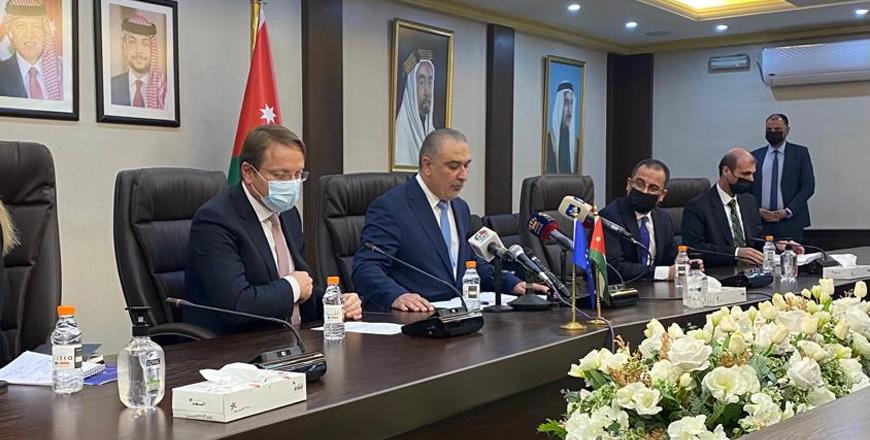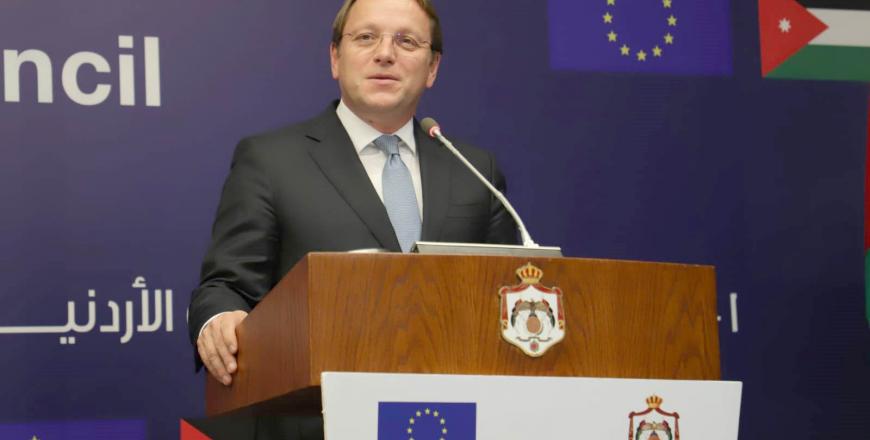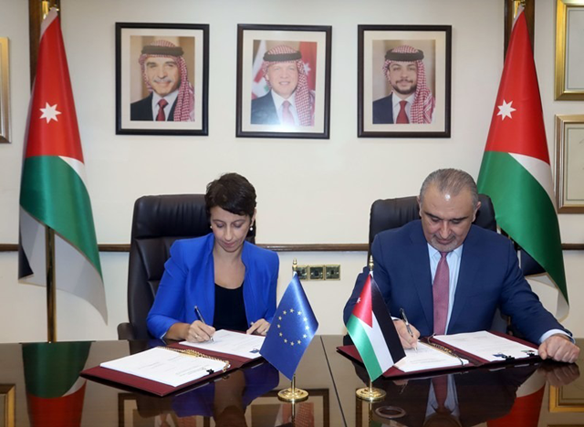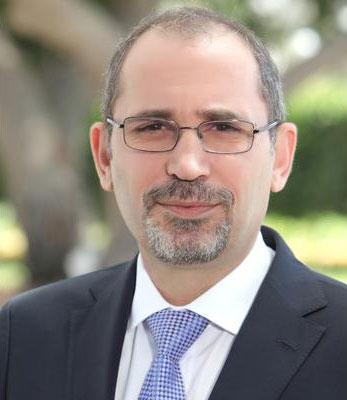You are here
EU to mobilise investments to Jordan worth 2.5b euros for years 2021-2027
By Maria Weldali - Dec 01,2021 - Last updated at Dec 01,2021

Planning Minister Nasser Shraideh speaks during a joint press conference with European Commissioner for Neighbourhood and Enlargement Olivér Várhelyi in Amman on Tuesday (Photo by Maria Weldali)
AMMAN — The Ministry of Planning and International Cooperation on Monday announced the EU’s intention to mobilise investments to Jordan worth 2.5 billion euros, including 164 million euros in grants for the current year, as part of the EU-Jordan Association Agreement for the years 2021-2027.
Speaking during a joint press conference with European Commissioner for Neighbourhood and Enlargement Olivér Várhelyi, Planning Minister Nasser Shraideh said that these grants will cover support for a number of sectors, including the water, energy, transport and infrastructure sectors, and stimulate investment in mega projects in partnership with the private sector.
Jordan and the EU have agreed on two projects to be implemented during the next phase: The rehabilitation of the King Hussein Bridge and the establishment of logistical services, to facilitate trade exchange between the Kingdom and the West Bank.
The second project is the desalination of 300 million cubic metres of water from Aqaba, to be transferred to Amman and the northern governorates, as part of the National Carrier Project, Shraideh noted.
He also highlighted that Jordan is seeking to renew a request for the EU to finance the general budget, which during the COVID-19 pandemic reached nearly 750 million euros, towards enhancing financial stability and covering the deficit, according to the Jordan News Agency, Petra.
The commissioner was briefed on the government's economic programme for the years 2021-2023, which focuses on recovery and economic growth by stimulating the private sector to create more job opportunities for Jordanians, especially for youth and women, and support the sectors most affected by the coronavirus pandemic.
On the Jordan Response Plan (JRP) to the Syrian crisis, the minister said that the funding rate has reached 23 per cent, pointing to the “reluctance” of the international community to continue support for refugee-hosting efforts.
Várhelyi noted that the main challenges facing Jordan have been grouped in a mega project, in order to boost the economy and thereby positively impacting the lives of people.
Illustrating the new level of cooperation and commitment with Jordan, Várhelyi pointed out that Jordan will receive 2.5 billion euros in the next seven years.
Várhelyi said that the new financing of 2.5 billion euros for Jordan would increase GDP by 7-8 per cent, and could enhance economic growth and job opportunities, which improve citizens lives through major projects.
The support is comprised of blending, guarantee financing and public-private partnership investments.
On Tuesday, Shraideh and Várhelyi also agreed on immediately establishing the EU-Jordan Investment Platform, which is a framework through which all the projects that are under the Economic and Investment Plan will be implemented.
The two sides, during the press briefing which took place at the ministry’s headquarters, discussed the new agenda for the Mediterranean, and its Economic and Investment Plan, which is regarded to be EU’s contribution to the post-pandemic recovery of the region, that aims to make the region’s economies more resilient and create employment opportunities.
Appreciating the EU’s continuous efforts and support for the Kingdom, Shraideh highlighted the EU’s role in maintaining and sustaining Jordan’s micro-economic stability, addressing various challenges in a number of key sectors, and boosting Jordan’s recovery.
“The EU will continue to be a close friend and a close partner that helps Jordan in moving forward and creating better prospects for its future,” Shraideh said during the press briefing.
“Jordan is a key partner for the EU, and it is an anchor for us in the region. Its resilience, stability, security and prosperity are crucial,” Várhelyi said.
He said that the EU is interested in not only maintaining good relations with Jordan, but also in raising the level of engagement with the country, and finding new areas of cooperation.
The commissioner valued the vital, stabilising role played by Jordan in the region and the efforts of His Majesty King Abdullah, appreciating the Kingdom’s hosting Syrian refugees.
He stressed that the stability, security, prosperity and resilience of Jordan are important factors that reflect on regional stability and prosperity of the region, highlighting the EU’s commitment to its partnership with Jordan, especially in the journey of economic recovery.
Shraideh indicated that the meeting provided an opportunity to inform the European official and the accompanying delegation about the current reality of the Jordanian economy, especially high unemployment among young people, noting that these challenges have exacerbated as a result of the coronavirus pandemic.
Shraideh highlighted the historical EU-Jordan relations, which have witnessed a leap in recent years thanks to the efforts of His Majesty the King and his continuous meetings with officials in the EU institutions.
Related Articles
DEAD SEA — European Commissioner for Neighbourhood and Enlargement Oliver Varhelyi on Thursday announced the launch of the EU-Jordan Investm
AMMAN — Minister of Planning and International Cooperation Nasser Shraideh and EU Ambassador to Jordan Maria Hadjitheodosiou on Monday signe
AMMAN — Deputy Prime Minister and Foreign Minister Ayman Safadi on Wednesday announced that the 14th meeting of the EU-Jordan Association Co


















